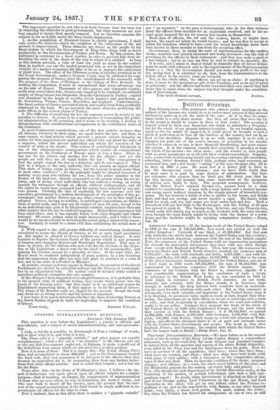CUSTOMS SUPERANNUATION QUESTION.
Liverpool, 13tIt January 1857.
This question is now before the Legislature; a puzzle to officials and non-officials, and a subject of much misunderstanding and misrepresentation.
I wish, as briefly as possible, to disentangle it from a verbiage of words, and to show what it is, and what it is not.
The Tissues calls it a "gigantic swindle," and other papers are equally complimentary ; while a few call it "an injustice" to the officers, and one or two say that Government ought not, in fairness, to make a profit out of the deductions from salary which are intended for a secificp purpose.
Now it is none of these. But it is simply this—The Fund, during Pitt's time, had accumulated to about 800,0001.; and as the Government wanted the hard cash, they took possession of it, and gave to the officers what they deemed an equivalent for it, by exempting them from any further deductions from their official salaries. And so ended that bargain; not a bad one for the State.
Years after this—in the Duke of Wellington's time, I believe—the impost of deductions was again placed upon all official salaries for a similar purpose—that of meeting, as alleged, the requirements of superannuation of those who are now called, by way of distinction, the modern clerks ; and who now wish to throw off the burden, upon the ground that the interest of the second accumulation of the fund would be amply sufficient to superannuate all officers for the time to come.
Now I contend, that in this affair there is neither a "gigantic swindle" nor "an injustice" on the part of Government, who in the first instance freed the officers from taxation for an equivalent received, and in the second again imposed the tax for reasons best known to themselves.
Each class of officers, the o/of and the modern, knew, or might have known, the exact net salary he would receive; and he was nee to accept or refuse the situation offered to him,—and his actual knowledge must have been known in three months or less from his accepting office. Government, then, in fixing the scale of superannuation for the modern clerks—numbers now greatly increased and being increased—run the risk of providing for the officers in their retirement : and they may make a good or a bad bamain ; but in no case CAD they be said to commit an injustice, ere. It is true, and I admit it, that it would be desirable that all future deductions be made with reference only to the requirements of the Superannuation Fund—i. e. that the Government should not make any profit in the matter, seeing that it is admitted by all, that, from the Commissioners to the lowest officer in the service' none are overpaid. Yet, in the whole affair, the officers can set up no claim : if anything is. done, it must be the spontaneous gift of the Treasury, and as an act of grace or generosity : and the officers had better consulted their own case if they had borne this in mind when the subject was first brought under the consideration of Government.
Your most obedient servant, Iusrus.


































 Previous page
Previous page